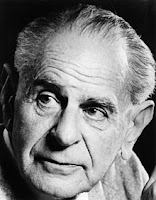 |
| Karl Popper |
Although it is fashionable to assert that Karl
Popper’s theories about the evolution of science are outdated, his definition
of what is a scientific theory is unassailable:
A theory is scientific
if and only if it is possible to design an experiment that proves that this
theory is false.
A paradigmatic case is the Copenhagen
Interpretation of Quantum Mechanics. In 1935, Einstein, Podolsky
and Rosen designed
an experiment that could prove this theory false. A few months later, Niels
Bohr published another
article in the same magazine, in answer to the previous article. Almost 30
years later, as I explained in another
post in this blog, the EPR experiment, which up to that point had been
mental, could be carried out and confirmed Bohr’s predictions, rather than Einstein’s.
As this theory was able to resist an attempt to prove it false, it must be considered a scientific theory.
Of course, this success of the theory does not
imply that it should automatically be considered correct or true. Scientific
theories (always according to Popper) never become so. This theory has
successfully withstood an attempt to prove it false, but the next attempt could
do it.
